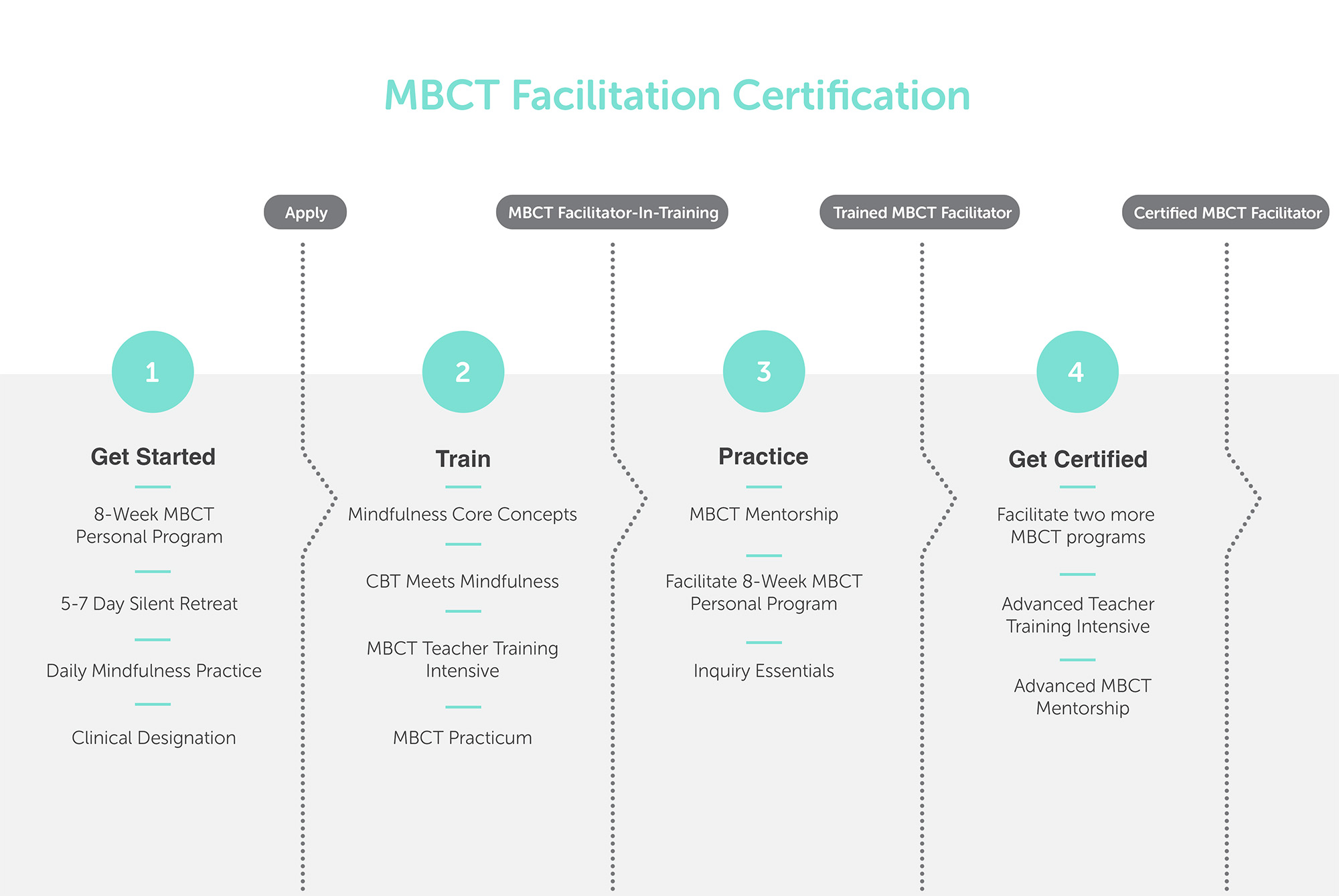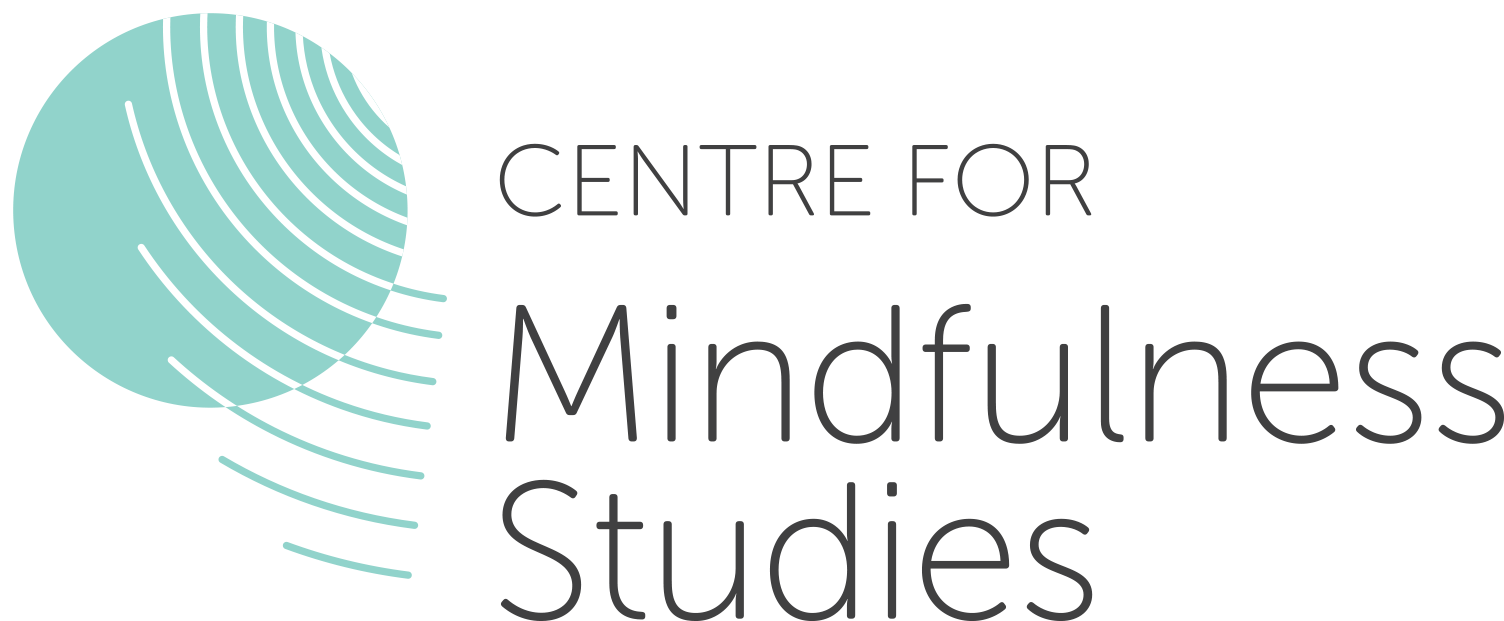Learn to Facilitate MBCT
Mindfulness-Based Cognitive Therapy (MBCT) is an evidence-based group modality to treat anxiety and mood disorders that combines the tools of cognitive therapy with the practice of mindfulness meditation. It follows an 8-week, group therapy curriculum.
The Centre’s MBCT Facilitation Certificate is an internationally recognized training pathway for healthcare professionals to become mindfulness facilitators. This is the only specialized training program for MBCT facilitation in Canada.

“The starting point for those wishing to teach MBCT for recurrent depression is to have had accredited training in counseling or psychotherapy or as a mental health professional with experience in mood disorders. In addition, training in behavioral or cognitive therapy or an equivalent evidence-based approach to depression, as well as experience in running groups, is needed….Recognizing the patterns of thoughts and feelings that create vulnerability (to depression) both refines the actual teaching of mindfulness and enhances its relevance to class participants.”
The first three steps of the MBCT training program are attendance-based and intended to provide accepted applicants with a level of training to enable them to offer this modality to the public as Trained MBCT Facilitators. Step 4 then allows trainees to hone their skills through a process of assessing their competency and ensuring their abilities to become a Certified MBCT Facilitator.

Step 1: Get Started
8-Week MBCT Personal Program
In order to facilitate the MBCT program with learned experience, it is essential that trainees complete an in-person or online MBCT program as a participant. The Centre welcomes all applicants to participate in one of our MBCT programs, but it does not have to be a Centre program to complete this prerequisite.
Learn more about our 8-Week MBCT Personal Program.
5-7 Day Silent Retreat
Participation in a longer, preferably residential* silent retreat allows trainees to increase their self-reflective capacity and to deepen their practice through periods of silence and inquiry. A 7-day (or longer) silent retreat is ideal while a 5-day silent retreat is sufficient. If applicants are unable to participate in a 5-7 day silent retreat, the Centre will accept the completion of a 3-day silent retreat as well as a 2-day silent retreat. In exceptional circumstances, we may also accept a 3-day silent retreat combined with the completion of two 1-day silent retreats but please obtain explicit approval from the Centre before pursuing this last option.
* in most cases, non-residential and online silent retreats are accepted
Daily Mindfulness Practice
MBCT facilitators are expected to embody the practice throughout the 8-week program – not only during the scheduled sessions but with all participant and co-facilitator interactions. As a clear start to obtaining this goal, all trainees must have a personal mindfulness practice that includes at least 15 minutes per day of formal practice, at least 5 days per week, and have maintained a daily mindfulness practice for a minimum of 3 months.
Clinical Designation
MBCT is a psychotherapy intervention. Psychotherapy is governed under a controlled act in Ontario and in many different Canadian provinces, American states, and other countries and jurisdictions. If you live and work in Ontario, Canada, you must be a member of a regulatory body authorized to practice psychotherapy in order to enter the MBCT certification stream.
Clinical or mental health professionals living or working outside of Ontario, Canada must demonstrate an understanding of the regulation of psychotherapy in their jurisdiction, and their qualifications to deliver MBCT groups in that context.
Non-clinicians who are seeking access to the MBCT training pathway with an end goal other than facilitating the MBCT program should make this known on their application form.
Upon completing Step 1, the Centre suggests that you apply to the MBCT Certificate Training Program if you haven’t already done so.
Step 2: Train
Trained MBCT Facilitator Costs
| Costs as of June 2022 | |
| Application fee | $50.00 |
| Mindfulness Core Concepts | $475.00 |
| CBT Meets Mindfulness | $350.00 |
| MBCT TTI | $2,350.00 |
| MBCT Practicum | $2,550.00 |
| MBCT Mentorship – admin fee | $200.00 |
| Mentor Fees* (12 hours) | $1,800.00 |
| Inquiry Essentials | $625.00 |
| Total | $8,400.00 |
* Mentor fees range from $130 to $180 per hour; these calculations include mentor fees at $150 per hour for the minimum required hours.
These estimates do not take into account the increased registration cost of in-person intensives compared to those delivered online; nor do they reflect the increased cost of accelerated trainings.
MBCT Basics and CBT Meets Mindfulness can be taken in either order. Trainees do not have to have completed their 5-7 day silent retreat before taking these courses but it is highly recommended to have completed the 8-week MBCT personal program.
1. Mindfulness Core Concepts
Learn about the research and application of mindfulness in this 6-hour introductory training. This general course is most suitable for those interested in the personal and professional applications of mindfulness.
Learn more about Mindfulness Core Concepts.
2. CBT Meets Mindfulness
This 6-hour training provides a practical and nuanced exploration of the current landscape of cognitive therapies. It is most suitable for healthcare providers interested in learning more about cognitive behaviour therapy (CBT) and its integration with the “third wave” of cognitive therapies such as MBCT, DBT, and ACT.
Learn more about CBT Meets Mindfulness.
The MBCT TTI and the MBCT Practicum can be taken in either order but most trainees choose to take the MBCT TTI first. Trainees in the MBCT certificate program should complete the 5-7 day silent retreat before taking the MBCT TTI; if they have not, they must contact the Centre before registering to see if an exception can be made. The Centre does accept registrants who are not pursuing the MBCT Certificate into these training modules; however, if those registrants then decide to pursue the MBCT Certificate they must go back and complete all other prerequisites and training modules.
3. MBCT Teacher Training Intensive
This innovative 5-day intensive training combines elements of a clinical training workshop and a meditation retreat. Participants are guided through an in-depth study and experience of the foundational underpinnings, mindfulness practices, and specific exercises that are the framework of the MBCT program. Trainees will engage in teach-backs of the various meditations and cognitive exercises. Whether taken in-person or online, participants can expect to spend some periods in silence and others in active discussion and interaction. The course follows a concentrated schedule and it is highly recommended that trainees clear their schedules as much as possible and use any free time for rest, relaxation, and reflection on the course learnings.
Learn more about our MBCT Teacher Training Intensive.
4. MBCT Practicum
This 10-week training module immerses trainees in the MBCT program as participants, facilitators, and observers. This highly interactive course provides the opportunity to lead meditations and inquiry in teach-backs, practice sessions, and recordings. During this practice, participants receive feedback and coaching in guidance, inquiry, session organization, and managing the group. A significant amount of reading and home practice is involved and it is highly recommended that trainees enroll 3-4 weeks in advance at which time they will receive access to the materials.
Learn more about our MBCT Practicum.
Step 3: Practice
Trainees are encouraged to facilitate and practise as much as possible in order to refine their skillset and enhance embodiment. It is highly recommended that trainees facilitate at least one MBCT program before taking Inquiry Essentials. This does not have to be the same program through which they are mentored but most trainees choose to be mentored through the first group they facilitate.
5. MBCT Mentorship
The Centre considers mentorship essential for competency in any therapeutic domain and we are proud to have more than 15 Approved MBCT Mentors. A minimum of 12 hours of mentorship over the course of one 8-week MBCT program is required to complete this training module. Trainees should start by contacting their preferred mentor(s), entering into a mentorship agreement, and submitting the $200 administrative fee. Questions or concerns regarding mentorship should be addressed to education@MindfulnessStudies.com.
Learn more about MBCT Mentorship.
6. Inquiry Essentials
Inquiry is the post-practice and exercise dialogue of investigating experience intended to inspire curiosity and develop equanimity. It is at the heart of mindfulness-based programs and is often the most difficult skill to learn. This 12-hour training is suitable for any mindfulness facilitator who has facilitated at least one mindfulness-based group.
Learn more about Inquiry Essentials.
Upon completing Steps 1-3, trainees can refer to themselves as a Trained MBCT Facilitator.
Step 4: Get Certified
Certified MBCT Facilitator Costs
| Costs as of June 2022 | |
| Advanced TTI | $2,095.00 |
| Advanced MBCT Mentorship – admin fee | $200.00 |
| Mentor Fees* (12 hours) | $1,800.00 |
| Total | $4,095.00 |
* Mentor fees range from $130 to $180 per hour; these calculations include mentor fees at $150 per hour for the minimum required hours.
These estimates do not take into account the increased registration cost of in-person intensives compared to those delivered online; nor do they reflect the increased cost of accelerated trainings.
It is expected that trainees will facilitate at least two additional 8-week MBCT programs before pursuing this final step in the MBCT training pathway. The ATTI and Advanced MBCT Mentorship can then be taken in any order although most trainees choose to complete the ATTI first.
7. Advanced Teacher Training Intensive
This 4-day intensive training focuses on advanced inquiry and embodied presence through teach-backs, coaching, and feedback. It is suitable for any mindfulness facilitator who has facilitated at least three mindfulness-based programs.
Learn more about our Advanced Teacher Training Intensive.
8. Advanced MBCT Mentorship
As with the first round of mentorship, trainees should start by contacting their preferred mentor(s), entering into a mentorship agreement, and submitting the $200 administrative fee. Many trainees choose to stay with the same Approved MBCT Mentor but there is no requirement to do so. A minimum of 12 hours of mentorship over the course of one 8-week MBCT program is required to complete this training module. Certification will not be obtained until the mentor writes a letter of recommendation on behalf of the trainee. The recommendation letter is expected to make clear reference to the trainee’s abilities in each area of the MBI-TAC. Questions or concerns regarding mentorship should be addressed to education@MindfulnessStudies.com.
Learn more about Advanced MBCT Mentorship.
Upon completing Step 4, trainees can refer to themselves as a Certified MBCT Facilitator.
Finished all of the training modules to become a Certified MBCT Facilitator?
If you plan on applying to both MBCT and MBSR Facilitator Training Pathways, please consider these requirements: You would need to take both 8-week MBCT and MBSR personal programs, take each MBCT and MBSR Teacher Training Intensives, complete one of the Practicums, 12 hours of mentorship in both MBSR and MBCT, complete one Inquiry Essentials course, one Advanced Teacher Training Intensive, and one round of mentorship in either MBCT or MBSR (depending on which Practicum was completed)
